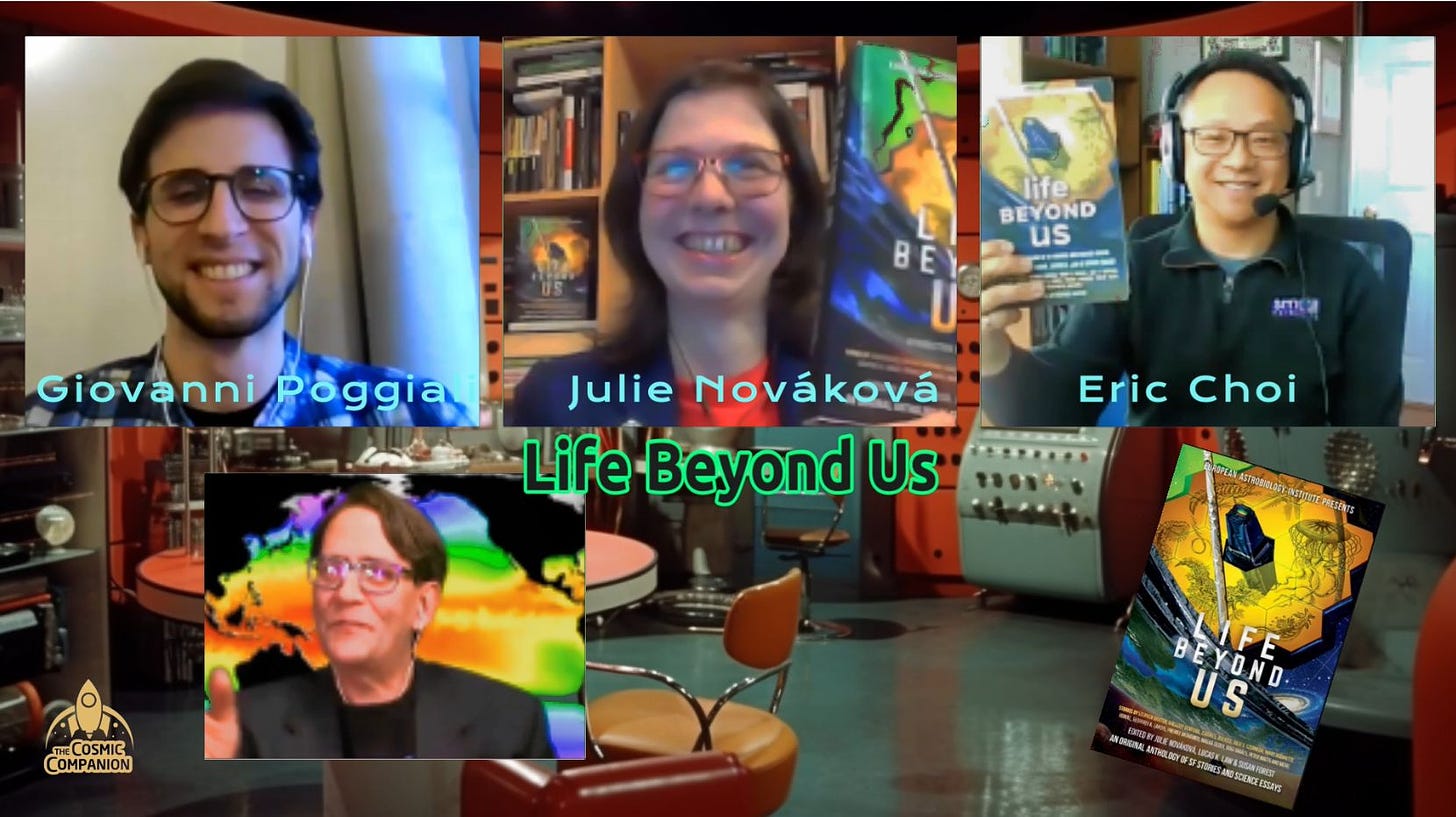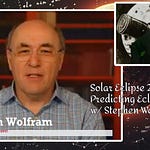This week, we will explore the possibilities of alien life as seen through the eyes of science and science-fiction. We welcome creators of Life Beyond Us from the European Astrobiology Institute
Hello everyone!
For Easter week, as most people share fables of giant anthropomorphic rabbits distributing chocolate eggs, we are Exploring Extraterrestrial Life through Science and Science Fiction. Later in the show, we will welcome Julie Nováková, Giovanni Poggiali, and Eric Choi to the show, talking about their new anthology, Life Beyond Us.
The idea of alien life has fascinated us for centuries. While science fiction has often portrayed extraterrestrial beings as having advanced intelligence, strange abilities, and/or a thirst for human flesh, the scientific reality is likely somewhat different. So, let’s buckle up and take a journey through the fictional and scientific world of extraterrestrial life, shall we?
Listen to the podcast version of this episode here or watch it as a video!
In science fiction, aliens come in all shapes and sizes, from little green men on Mars to the Greys, Alpha Draconians, and every… thing… in-between. [[LAUGH]]
These fantastic stories often involve intrepid explorers traveling through space, boldly going where no one has gone before, battling aliens and uncovering hidden mysteries along the way.
The search for extraterrestrial life in our own time and reality (if THAT’S what you want to call this! Hmm…) typically involves telescopes on Earth as well as in space. (James Webb Telescope, I’m looking in your direction!).
Specialized instruments scan the skies looking for telltale signs of life on other worlds, such as the presence of methane, oxygen, or other known chemical markers of organic biology.
Life sprung up on Earth soon after our nascent planet formed 4.5 billion years ago. [yay!] However, the first multi-cellular life did not make an appearance until just 600 million years ago. [aww…] And paninis, cappuccinos, and radio telescopes came far later. [Mmm… Paninis…]
Such microbial life might exist in a variety of places in our own solar system, such as on the icy moons of Jupiter and Saturn, or under the ruddy surface of Mars.
If life on other worlds follows a similar path to our own, with microbes being the sole form of life on planets for billions of years, this could mean that exoplanets might be thriving with tiny microbial life for eons, without having lifeforms we might recognize as intelligent.
On many — perhaps most — worlds, life may have evolved in environments unimaginably different from our own. Beings living on distant exoplanets and moons may even be unrecognizable to humans, limited by our collective knowledge amassed over just a few short millennia, living on a tiny world orbiting a modest star.
Next up, we have our first-ever triple interview with three of the creators of the new science/sci-fi anthology, Life Beyond Us.
If life on another planet were to develop a technological civilization comparable to our own, it is very possible — but by no means certain — they would stumble across radio transmissions which might be seen from Earth.
Radio works so well for communication here on our home planet in part because radio waves can bounce off the ionosphere in the upper atmosphere, and be received by a listener at a far greater distance than would be possible with only a direct line-of-sight signal.
Other worlds are likely to have different physical and chemical characteristics, shaping technologies of possible alien civilizations, and with it, the artificial signals their planets emit.
Still, large full-sky surveys, recording radio emissions seen over vast swaths of sky night after night, are already building gargantuan databases of observations. Once examined by cutting-edge artificial intelligence, these instruments could soon reveal intriguing signals from amongst the stars.
[Next question — could intelligent life on other worlds be dangerous?] {Why! Thanks for asking!]
From the Earth vs. the Flying Saucers to Mars Attacks and beyond, we’ve seen countless examples of extraterrestrial life that seeks to destroy humanity. They come to Earth to conquer and dominate, using their advanced technology and/or superior physical abilities to wipe out humanity. Any civilization capable of bringing beings (or drone weapons) to Earth is, by definition, far more advanced than us as far as technology goes.
[So, basically, if you are thinking humans could put up any kind of real defense against any hostile aliens which did arrive, well… I have some bad news for you. It wouldn’t even be a contest.]
But, this would also mean they have survived for a long time with the ability to wipe themselves out and haven’t done it. If they survived the double-edged sword of technology, they have almost certainly moved beyond the need for war and conquest, making it unlikely they would engage in the kind of violence we see in so much sci-fi.
[He’s right.]
Who knows what amazing discoveries we’ll make in the future? Maybe giant anthropomorphic rabbits distributing chocolate eggs!
[Next week on the Cosmic Companion, we kick off a two-week celebration of Earth Day! So, The Cosmic Companion has asked me, Gaia, mother of Earth, to make the announcement.
On 15th of April, we will be talking about How Children Can Rescue the Planet. We’re going to be joined by joined by Cliff Lewis, author of We the Future. Then, on the 22nd — Earth Day itself! — we will dive into the importance of one of our most vital resources — water! We will be joined by Sandra Postel, director of the independent Global Water Policy Project. Make sure to join us both weeks!
I’m serious. I’m basically Mother Nature. It’s not nice to stand up Mother Nature]
[There are more episodes of The Cosmic Companion at The Cosmic Companion.com and .net. Like, lots of them. They’re like eggs in an Easter basket, I tells ya. If you like this show, comment, subscribe and share. You want the number of subscribers to multiply, don’t you? Go on, then. Hop to it!]
Until then, clear skies!
James
























Exploring Extraterrestrial Life through Science and Science Fiction w/ Julie Nováková, Giovanni Poggiali, and Eric Choi